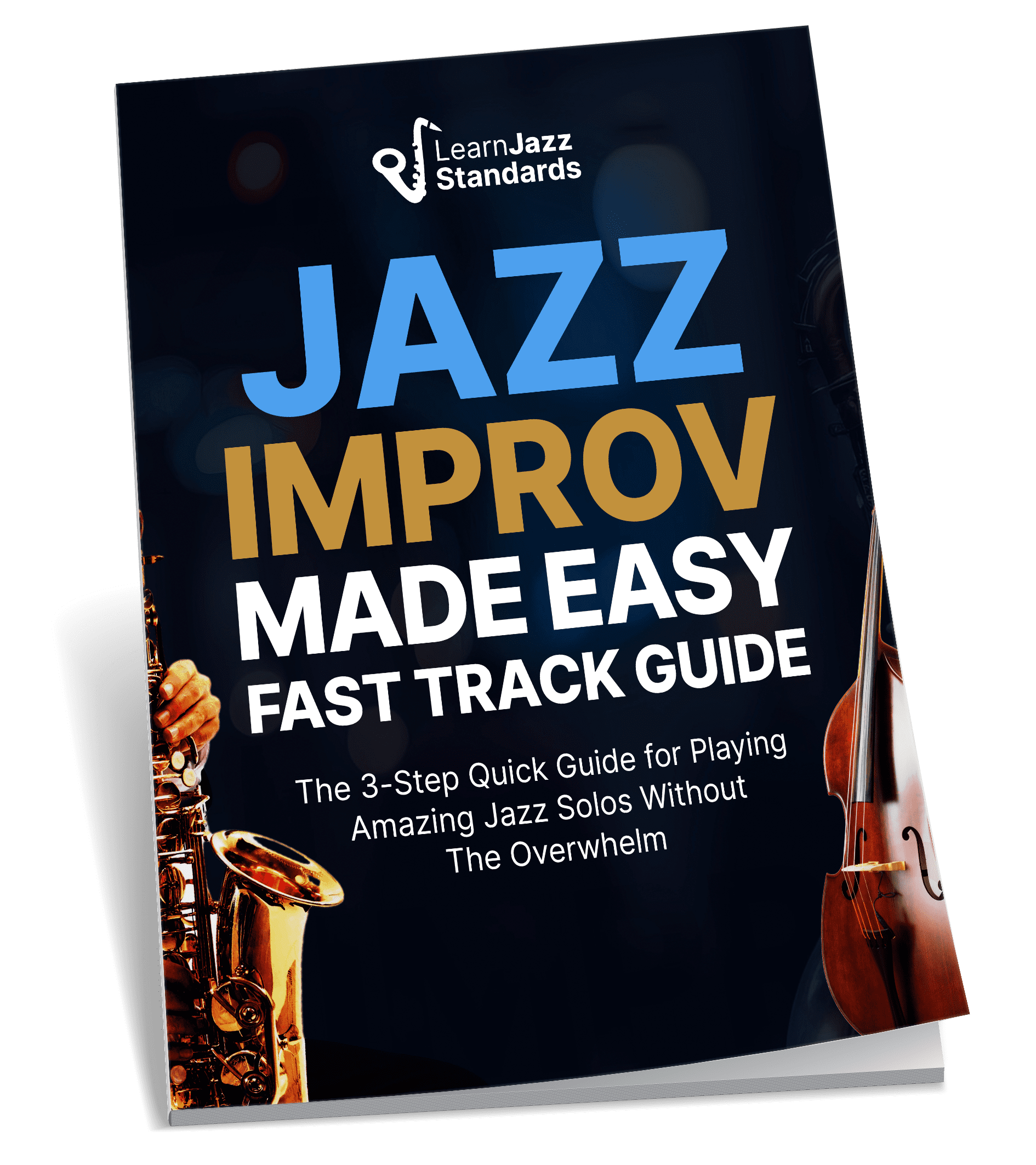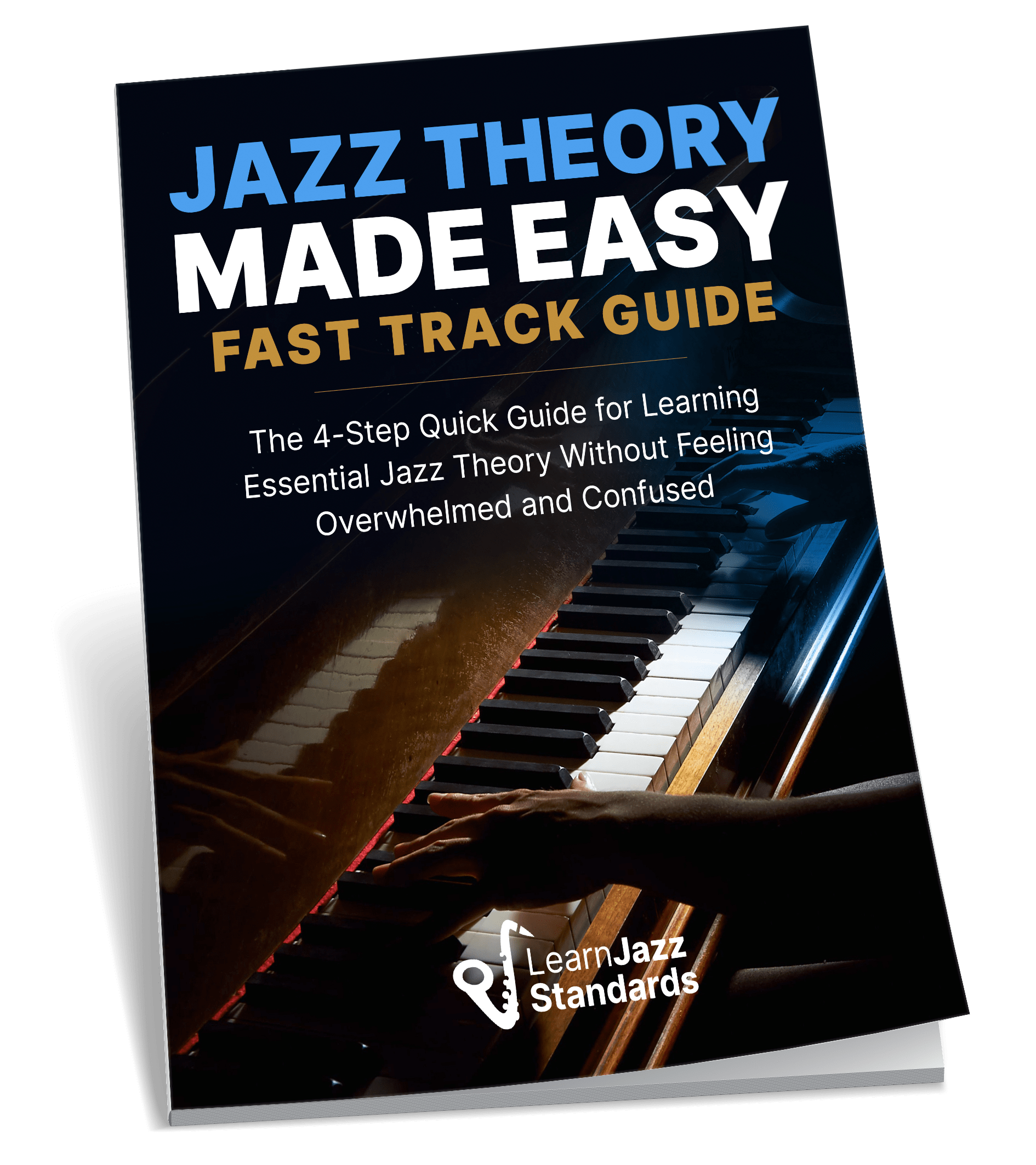Welcome to episode 98 of the LJS Podcast where today we are joined by sports and performance psychologist Matt Vaartstra to talk about how to channel your mindset towards musical freedom. At the end of the day, music is a brain game. There are so many negative voices that hinder our progress, and Matt teaches us how to train your brain for optimal performance. Listen in!
Listen to episode 98
When it comes to becoming a better jazz musician, or any musician for that matter, your mindset plays a huge role in your success. The brain game is of equal or greater value than the actual physical side of practicing or playing.
I have experienced this time and time again in my own musical development as well as observed it in my peers. I have walked into gigs with negative thoughts of my own playing or ability, and suffered. I’ve also approached my playing with confidence and positivity, and come out on top.
Being a musician is a brain game, and it’s up to us to control it so that ultimately we can achieve musical freedom and enjoyment.
Joining me on the show today is a very special guest. Even more special than normal because it’s my brother, sports and performance psychologist, Matt Vaartstra. I’ve mentioned him on the podcast before as a great example of someone who sets personal goals vs. viewing things as outside competition. Though we talk about this, we talk about so much more.
Here are some of things discussed in today’s show:
1. The power of mindset over musical performance.
2. How to train a positive mindset with a Self-Talk Script.
3. Using the “Three D’s” to cut off your negative thoughts.
-
Detect
-
Disrupt
-
Dispute
4. Honing in on musical personal records vs. competition.
5. Fixed vs. Growth Mindsets.
6. How to measure your personal progress.
Today’s episode is so important. I can’t stress this enough. If we truly want to achieve musical freedom and become the best jazz musicians we can be, we have to train our brain.
My challenge for you is to write your Self-Talk Script this week and utilize the “Three D’s” to disrupt your negative voice. I’m in this with you, and I believe we’ll be better musicians because of it.
Important Links
“Mindset” by Carol Dweck[vc_separator]
Free Guide to learn standards by ear: Learn Jazz Standards the Smart Way
Read the Transcript
Brent: All right, what’s up everybody? My name is Brent. I am the jazz musician behind the website, learnjazzstandards.com, which is a blog and a podcast all geared towards helping you become a better jazz musician. Welcome. If this is your first time ever listening to this show, and if you are a regular listener I want to thank you for being here week after week, listening to me talk, hanging out with me, and to return the favor I just want to give you as much value as I possibly can today. So, for today’s episode 98 I’ve got an incredibly special guest on the show.
We haven’t had a guest on for the last several episodes, and so I’m excited to bring on someone who means a lot to me and I’ll tell you why in a second, but I’m really excited because this episode offers a lot of value. I mean, this is a really value-packed episode that I think is one of my favorite episodes that we’ve had in a while, and I really can’t wait to share this with you. It’s a little bit of a longer episode today, but I don’t want you to miss a single minute of this episode because I believe this stuff is that important, and my special guest today is none other than my older brother, Matt Vaartstra.
Yeah, that is right. I’m bringing on my older brother onto the show, and today he’s gonna talk to us all about the mindset, training your brain towards positivity so that it can affect your music and give you ultimately musical freedom. This is incredibly important. My brother, he has a PhD in sports and performing psychology. I mean, this guy is brilliant. He’s a teacher and man, he just lays down the good word today and I really appreciate it, and when I was first inspired to have him on the show it’s because I’ve actually mentioned him multiple times on this podcast over the last few years, in the past, talking about his idea of personal records and how in high school, when he was on the track team, he always was really concerned about his personal record over and above competing and beating out everybody else. I remember being so inspired by that as a kid, and that really helped me when I got a little bit older and tried to start framing my mind and training my mind to think more that way, but in toady’s episode we talk about that stuff.
We talk about the entire spectrum. How important the brain game is when it comes to becoming a better musician, becoming a better performer in general, and really when it comes down to it, it could be … The mental side of all of this really can make up at least 50% of your success. If you’re training with negative thoughts, if you’re thinking negatively it can severely affect your progress in the practice room or your performance on the gig or the jam session. So, this is really important stuff. I want you to listen to this and over the last month here, the month of January, the unofficial theme of this month has been productivity and goal-setting and achievement, and so this episode just really ties in really well for all of this. Now, you can find the shows today at learnjazzstandards.com/episode98, but without further ado, let’s get on my older brother, Matt Vaartstra.
All right, welcoming on the show today is … He has a PhD in sports psychology, he’s a video game enthusiast, he is a hockey nerd among many other things, but he’s also my older brother, so I’m very proud to welcome onto the show Matt Vaartstra. Matt, thanks for being here.
Matt: Yeah, thank you. Thanks for having me on the show. Happy to be here, looking forward to our conversation.
Brent: Yeah, and I thought long and hard about having you on the show because in my childhood … I still see therapists on a daily … Weekly, just because of all the older brother stuff that … Destroying my Lego towers and just a lot of stuff.
Matt: Trauma.
Brent: Yeah.
Matt: Trauma.
Brent: A lot of trauma I’ve been dealing with. But at the end of the day I was like, “We’ve gotta get this guy on here,” but especially because actually … And I said this in the intro to the show, I’ve used you multiple times for examples of setting personal records and I mentioned … I just thought, “Man, I need to get my older brother on the show,” because you know so much about this stuff, and you have a PhD in sports psychology. So, I mean, you have so much to offer on this subject, but I thought just … Everybody knows you’re my brother now, but let’s find out what you’re all about. So, if you wouldn’t mind just telling the audience what’s your one minute Matt Vaartstra bio. What you do, what you’re all about, what gets you going.
Matt: Yeah, absolutely. So, currently I’m the assistant director for career services with the University of Idaho Career Services Office. So, I’ve been working with them on and off for quite some time. Was working with them during my PhD, like you mentioned, PhD in sports psychology. Got that at the University of Idaho. While I was getting my PhD I was also doing my … Working at the Career Services Office and what I ended up doing for my dissertation was actually comboing those things together into working with student-athlete on career development related issues, as well as consulting with student athletes on performance related topics, mental training, mental skills from a sports psychology perspective, and so being able to combo those together and work in career services while still helping student-athletes on performance related issues, as well as finding career options and being successful, in the performance environment that is job searching and finding a career has been my focal point over the past few years.
Brent: So, what got you into the whole sports psychology department in the first place, because I know because I know you that you started out in chemistry when you started college.
Matt: Right.
Brent: You were following in our father’s footsteps, but then you made this change. So, what excites you about it, what made you excited to go into this direction and start learning about that?
Matt: Yeah. Great question, and to keep the story shorter rather than longer, I was. I was a chemistry major, then I was an engineering major for a little while.
Brent: Right, yeah.
Matt: And I really … I was good at it but it wasn’t … I wasn’t passionate about it, and so I started searching for something that I was passionate about, something that I really cared about and I stumbled across … One of the degrees that was available was this sports science degree with an emphasis in sports psychology, and I was like, “What is sports psychology?” I had no idea what it was at the time when I was a freshman in my undergrad and discovered that that was really an area of interest for me. I had taken some psychology courses, really liked the concept of what psychologists do and the helping realm of that. Finding out what makes people tick and how to maximize that, and then finding out there was a sports side, a performance side to that. How do maximize human performance from a mental standpoint rather than just a physical standpoint was really fascinating.
One of the ways that I sell sports psychology, performance psychology to people is I ask them, “What percentage of your performance do you think is mentally based?”
And you can ask anyone this question, it can be a sports performer, it can be a musician, it could be a dancer, it could be anyone who’s in a performance environment, “What percentage of your performance do you think is mental rather than physical,” and the answer typically, for athletes anyway, is anywhere from 50% to 90% is mental. And then you follow up with this question, “Well, what percent of your time do you spend practicing your mental skills as opposed to your physical skills?” And the answer is almost always, “100% of my time is spent physically practicing,” but you just told me that anywhere from 50% to 90% of your performance is based on your mental skills, so there’s a disconnect with a lot of performers between … They’re training the physical side, which is clearly very important, but then they’re not training the mental side, which they’re telling me is at least equivalently important to their physical training and performance, and so that was …
That has fascinated me, the dichotomy between physical training and mental training and how people tend to spend all their time focused on physical training when you know inherently that the…things is very important. And so, getting people to start thinking about, “Well, how much time should I actually maybe redirect away from physical training into mental training,” is something that I think helped to drive me down the path towards sports psychology and performance psychology.
Brent: Awesome, and I remember actually the first time you explained to me you were gonna be doing sports psychology. What’s sports psychology? That’s so weird. You were talking to me about it and basically everything you just said just now, and I remember thinking to myself, “Why don’t musicians have psychologists?” Why isn’t this a thing, and it is, it’s performance psychology, but why isn’t it an actual thing. I guess probably because musicians can’t pay for it. I mean, unless it’s some big organization that’s going on. Quick question, so how do you get a jazz musician to get a million dollars?
Matt: I don’t know the answer to that question.
Brent: You gotta start with two million dollars. Ba-dum. Yeah, so … That’s such a corny joke. I’m sure … There’s so many of those weird jokes. Anyway, when I first heard about this I’m like, “Oh, my gosh. I have this problem all the time,” and it’s not just me. So many musicians have this exact same problem that anyone who has to perform, whether it’s in athletics, whether it’s in the fine arts, whether it’s in dancing like you said, or music, whatever it is, it’s such a big psychological game. I have definitely been in the position many times where my head’s not in the right space. If I’m not prepared to be in a positive space for my playing, what I’m about to and what I’m trying to achieve, things can easily go south, or even if I’m too worried about what I actually want to accomplish or play as a musician. It can completely …
It can completely ruin my time, but the best music that I’ve ever played has been when I came from this place of confidence, this place of relaxation rather than tensing up, relaxing. I think it’s an amazing thing what you said is how much time do you spend working on the physical stuff, and musicians are the same way as athletes in that. We work on physical technique and skills and learning repertoire, doing all this stuff, but we don’t really ever spend time actually working on the other side, that nagging voice in the back that’s working. So, that’s why I’m especially excited to have you on here because man, you just have so much to talk about with this. So, moving on from this a little bit … Well, still on the same topic here, but what are some of the main psychological barriers that are causing poor performance that you’re seeing in athletes and maybe that can go along with musicians as well.
Matt: Yeah, I think … I think this particular question is something that people ask a lot and I think that it’s highly individual. Everyone comes to the table with their own strengths, their own weaknesses, and their own propensity to be good at certain parts of the mental performance aspects of things and to maybe suffer from some other things. That voice in the back of your head can be very positive or very negative depending on how your self-talk is and the types of things that you say to yourself and the place that you come from when you’re heading into a performance environment, and so it really does become highly individual. But I think traditionally speaking a lot of the standard barriers that you’ll run into in a performance environment are things like lack of focus, and there’s lots of great ways to address things like that. Goal-setting is one of the big ways that you can address a lack of focus, and that can be focus during training.
When you’re practicing, if you find that you’re just going through the motions obviously you’re not gonna get the most out of that, even during the physical components of training, and so you can set goals to be more on task and to be more present during those types of things, and I think that self-talk is another really big area that becomes a barrier. I think a lot of people’s actual tendency is to have the voice in the back of their head that has a more negative tone to it. It’s more debilitating than it is facilitative, and I think the way to combat that is to practice positive self-talk, to practice saying the things to yourself that put you into a positive place. Everyone has so many positive characteristics, positive qualities, strengths, and the tendency is not to talk about those things to yourself, not to think about those things with yourself. There’s a tendency in a lot of people to focus on the flaws, the weaknesses, the things that could go wrong. When you focus on those things the propensity for those things to happen becomes increased.
Things probably are gonna go wrong because you’re thinking about the things that are gonna go wrong. You’re gonna trend into that direction, and so when you can change your self-talk, when you can change the way that you think about things to a more positive framework, I think that’s one of big issues that people have, one of the barriers, and there’s a relatively easy solution to it, too, is to change your self-talk. That’s not to say that changing your self-talk is something that happens overnight, but it is something that you can do over time without having to invest major shifts in your life. It’s small changes that you can make to the way you think that can really change things in the long run for you.
Brent: So, how does that in real … How do we actually apply that? Actually, as you’re saying this I’m thinking about a few years I played with a group and funny enough, one of the musicians, he’s actually the band leader, and he … He was a little bit maybe behind in skill level with some of the other musicians that were playing in the band, but he had hired us because he wanted to play with us and it was a lot of fun.
We had a great time. None of us had any problem with the way that he played or anything like that, but I think he had a lot of this negative self-talk going on and got really inside of his head, really self-conscious, all these things, and all things that I can personally relate to, too, but I think for him it went to this very big extreme where he was actually making up excuses for why he couldn’t make it this week and why to send a sub, or even sometimes last minute bailing that just didn’t make sense, and a lot of us in the band realized … “I think he just is … He’s getting overwhelmed,” and he doesn’t … He feels anxious and he’s stressed about the situation. How could someone like that, who maybe is in … Everybody has a different … Maybe it’s someone in that extreme or maybe it’s somewhere in the middle.
Matt: Sure.
Brent: How could someone actually start practicing this positive self-talk? Is there a time of day you set … A time of the day you set aside, how does this work?
Matt: Yeah. Yeah, great question. Coming from an academic standpoint, we could teach entire courses on how to properly manage self-talk, and I have taught several courses that a large component of it has been self-talk. A couple tips for your listeners regarding self-talk … There’s two really big things that I think come into play here that you can actually engage in what I would call mental training in order to enhance your self-talk. The first one is a little bit more involved, and some people can … It feels hokey sometimes when people do it, but I don’t always guarantee, but I nearly guarantee, that it will enhance your self-talk to a more positive level, and that’s writing a self-talk script.
Brent: Oh.
Matt: I’ve encouraged athletes to do this, other performers to do this, and essentially what a self-talk script is you sit down and you actually type out, write out, some people will even verbally record it and listen to it so that they hear themselves saying it to themselves. That’s something that works for some people. Again, you have to find what works for you. A self-talk script really comprises what are the key things that you want to remind yourself of. What are the key things that you want to say to yourself on a regular basis, and it doesn’t even have to be specific to performance. Sometimes … Depends on the person, but sometimes people get stressed out or get into a bad mindset or a negative self-talk spiral because of what’s going on outside of their life. It could be something going on at home and then they’re coming into a performance thinking about something … So, self-talk scripts are …
Remind yourself of your strengths. Remind yourself of all the time that you spent practicing. Remind yourself of moments when you felt really great about your performances. Put yourself into that space where you remember how it felt to perform really well. Develop a self-talk script that will get you into that mindset, and there’s a lot of different ways to create self-talk scripts, and really it comes down to what works best for the particular individual. But a lot of it is about affirmation. A lot of it is about reframing sometimes. Sometimes you pick up on the types of negative thoughts that you have on a regular basis, and so then your self-talk script might include things that reframe those into a more positive light. Those are all potential components to this self-talk script, and so then you can start to read the self-talk script to yourself, listen to the self-talk script to you, being read to you by yourself, as a lot of times people do.
Some people put inspirational quotes into a self-talk script. I find that I like to read them in the morning. That’s me, personally. I tend to wake up … The most negative during my day is waking up in the morning. For whatever reason, that’s when I have the most negative thoughts, and so if I then can read myself talk scripts in the morning, listen to it on the way to work in the car … There’s a lot of different options that actually don’t take up any time. I’m gonna be sitting in the car anyway, and so then that’s a great space to do it in, and you can then find out what works for you for that self-talk script. But you’ll find that as you listen to that, that number one, it puts you in a good mood, and number two, it sets yourself up to think that way on a more regular basis.
Brent: Yeah, and what I love about what you’re saying is you’re talking about the affirmations and the power that it can have by writing them down. You’re talking about writing them down or recording them.
Matt: Correct.
Brent: One or the other so that you’re hearing that stuff, and one really cool thing is I picked up this journal sometime last year called The Five Minute Journal, and if you just Google that you can find that, and I’ll link that today in the show notes. The Five Minute Journal, it’s really cool, and I have to be honest, I haven’t kept up with it as well as I would like to. Sometimes I do it, sometimes I don’t, but one thing I’d like to share about it is that basically it’s cool. So, in the morning you’re supposed to … It’s literally supposed to take five minutes of your day to do this. So, the first thing is in the day is you’re supposed to answer, “What are you grateful for?” You write down something that you’re grateful for. The second thing is you … “What would make today great?”
So, you answer what would make today great. Whatever that is, whether it’s in your musical challenges or your daily life changes, whatever it could be, and the last one is a daily affirmation. Like, “I am … ” Fill in the blank, and I started doing that and I thought that was a very powerful tool to do. Again, feeling ashamed that I don’t keep up with it as well because it’s a great practice. Great thing is at night you’re supposed to list three amazing things that happened today and then the last is, “How could I have made today better?” So, a reflection thing.
Matt: Yeah.
Brent: Really cool journal. The Five Minute Journal, but anyway, I just totally resonated with what you were saying there, and one other thing that caught my ear that I’d like to go back to really quick is you were just talking about how we tend to sometimes, as human beings, we go to the negative things, and for musicians that happens all the time. You’re gonna start thinking about all the negative … “I biffed it on that line. I biffed it on that solo. I sounded terrible. I got lost. I feel ashamed.” You think about those things that happened, the poor times that happened and the things that you’re not good enough at yet, but you forget to think about the things you’re good enough at, and in the blogging, podcasting world someone I follow named Pat Flynn once said that …
Because sometimes you get trolls that want to say negative things to you and basically saying that one negative comment is greater than 100 positive comments. And it’s so true. If you get a lot of people saying, “Oh, that was awesome. I really appreciate what you’re doing,” but then one person’s like, “That was terrible,” that’s all you think about, and it goes the same with music. Thinking about music and your abilities, one terrible thing might’ve happened or not exactly what you wanted to happen in your music that you’re playing, but then you forget about all the awesome moments that did happen or the things that you are good at and that you are building up. Anyway, I just wanted to share that. I mean, what do you think about that whole, “One negative to 100 … ”
Matt: Yeah. Yeah, and I don’t know, numbers wise, if there’s anything to that, but I think that premise is absolutely correct. Imagine how much more impactful that is is when it’s your own thoughts. When it’s someone else saying it to you, that’s one thing, and definitely that’s true in the world today. Remember how much more impactful that can be when it’s yourself saying it to you, when you know there’s been a hundred good things that have happened to you during a particular performance, and then if you focus in on that one thing and you yourself are the person telling yourself that that was terrible and that’s all you’re remembering from that performance, I feel like that’s … For me anyway, that’d be even more powerful to be self-inflicting that on yourself. So, I’ll give you a second … My second piece of advice. My second tip for self-talk.
Brent: Okay.
Matt: And I call it the three D’s. It’s detect, disrupt, and dispute. So, the first one, detect, is … And this takes practice. You have to detect and figure out when you have negative thoughts. When is it that you start thinking negatively. This is more of a reactive self-talk mechanism. The self-talk script is more proactive. You’re trying to set yourself up for success with a script. The three D’s is more reactive. You’ve already started having negative thoughts. So, number one, you have to detect when you have negative thoughts, and that’s challenging because usually it’s so ingrained in you that it’s an automatic process. You start thinking negatively because that’s what you’ve always done, and so this takes a lot of skill and it takes a lot of dedicated time to figure out … And sometimes it’s reflective like your journal.
When was it that I started thinking negatively today? What set me off? And start to figure out when those times are and get good at detecting when negative thinking starts to happen. Once you’ve been able to start detecting when negative thoughts start to happen, then you have to disrupt those negative thoughts. I’ve had athletes that I’ve worked with that will do something physical. I had a basketball player once who would slap the ground to disrupt his negative thoughts, and it was really … It was fun because I would watch him during a game and he’d miss a shot and I’d see him slap the ground as he’s headed back in the other direction. I knew exactly what he was doing. I knew that he’d missed the shot and I knew that he’d started thinking negatively as a result of that and he was like, “No, I don’t want to think negatively,” and he …
Some people will clap, snap, a physical action attributed to a disruption to stop that thought. I had a football player once who would put his hand in halt motion because that’s what he wanted to do as his physical disruption mechanism to stop his negative thinking. And then the last piece is of course probably the most crucial piece of that, and that’s dispute. And this is where you start to use some of those positive self-talk things from your script even, maybe, to reframe your negative thoughts. Again, I use athletes as an example a lot. The basketball player who had missed the shot, you could think about, “Oh, man. That was terrible. I shouldn’t have taken that shot. I should’ve passed the ball.” You get into negative thinking patterns, the should’ves, the would’ves, the could’ves, the “I suck at this, I suck at that,” type of thinking …
When you get to this point of trying to dispute your negative thoughts it’s like, “Oh, I chose to shoot the ball there. Maybe next time I should be aware of what my passing options are.” And so you start to think about, “How can I take that and frame it into a more positive opportunity?” A lot of it becomes learning opportunities. Being okay with a mistake because it allows you to learn, and translating that into how you dispute your self-talk patterns. So, the three D’s are another way to reactively address any self-talk issues that you’ll run into, those negative thoughts that start to come up.
Brent: Awesome. So, number two is the three D’s, so could you say what number one was again?
Matt: Yeah, so detect … So, detect your negative thoughts, dispute … Or sorry, disrupt. So, detect, disrupt, and then dispute.
Brent: Okay, awesome. That’s so cool. I’m gonna switch gears just a little bit and I want to talk about something … I want to talk about competition for a second here, because in sports, which is where most of your work and experience has fallen in, it’s really centered around competition. In music, I’ve given before on this show, I’ve given my philosophy on music. I don’t believe that music should be a competitive event. I really don’t think it should be. I don’t think that’s … I don’t think that’s what music is for. I don’t think that’s what is needed in it to make better art. But oftentimes in music there is a lot of competition, and that usually comes in the form of comparing yourself to somebody else, whether you’re comparing your progress to someone else’s progress, whether you’re comparing your actual ability to someone else’s ability, and so here’s a question for you. What do you think are some of the pitfalls or even advantages to a competitive spirit in music or really in any kind of performance thing are?
Matt: Yeah. Great question, and I thinking that … I say this a lot to a lot of different people, it’s individual. Some people thrive in a competitive environment. Some people use that to fuel themselves and to become better, and that’s positive and that’s what can result positively from a competitive environment, both in sport and outside of sport. And then there’s other people who are gonna respond to competition … It’s a threat. It’s not a challenge. It becomes something where there’s a comparison and if the comparison doesn’t fall in your favor it’s failure in your eyes and then that becomes very negative and can set off all the negative self-talk stuff that we just talked about. And so I think it depends on your interpretation of that competition, and in sport it’s inherent …
It’s inherent. In sport, the whole point is to compete. The whole point is there’s gonna be a winner and a loser at the end of the day, and I think that becomes much more challenging, just get out of a competitive mindset, and I feel like in other performance environments, and for musicians in particular, because I agree with you in that it doesn’t need to be a competitive environment in music. It doesn’t have to be that way, and that’s where I think we start to focus in on something that I know you’ve talked about before on your podcast is being … Personally being your best, holding yourself to your own standard and not holding yourself to other people’s standards, and so regardless of the competitive environment I think that striving to be personally the best is really where you want to take that.
And again, some people really thrive off of comparison to other people, and they can use that. My argument would be that’s not true for the majority of people. Most people are gonna be more successful if they’re comparing themselves to themselves and making sure that this performance is better than my last performance.
Brent: Actually … Yeah, and that’s definitely where I fall in line, and actually, on this particular topic of personal records is actually where, and I’ve already said this is in the intro to the show, but it’s where I first was inspired to think about you, of having you on the show. Because the story I’ve told on the podcast over the last few years now is that in high school I always got this sense when you were on the track team that you were really concerned about your personal record, and you really seemed to de-emphasize the idea of winning. Not that you … I’m not saying you didn’t want to win or that you didn’t want to at least place well. I’m sure there’s a competitive spirit there, but I felt like you were more competitive with yourself more than anything else, which was the opposite of me.
I actually remember when I was doing track and sometimes we’d go to the same track meets. I was younger than you, but we were at the same track meets, and for me it was the most stressful, gut wrenching thing because I was so overwhelmingly concerned about winning or placing well in the race or whatever it was, the event I was doing, that it consumed me to the point where I don’t believe that I performed even at half the potential. I really do believe that. I don’t think I performed at even half the potential because I was more worried about … I wasn’t worried about, “Am I gonna do better than I did last time?” No, I was worried about, “Am I gonna do better than that guy?”
Matt: Right.
Brent: So for me, I would definitely fit into that category of people that do not perform as well. So, what … Going back to our childhood here for a second, what set that into your mind to think that way?
Matt: Yeah, and part and parcel of that is really just track and field as a sport is really conducive to personal records, personal bests. It’s easy within that particular sport to develop that mindset, and I think a lot of track athletes actually do develop that mindset because of that environment. You can strive to be … I was a long jumper and a triple jumper and it was always, “How many more inches can I get on my previous best?” And I think that just inherently developed in me and I think that became really critical. You mentioned how you felt like you didn’t perform nearly to your best capacity because you were constantly focused on other people, and I never had to feel that way because I was always focused on how can I become … How can I jump two inches further than I jumped the previous … In practice, even, or the previous meet.
So, that inherently was easy to do and I think just becomes so important because in sports psychology and in performance psychology we talk about attributions a lot, and when you start to attribute things to things that are outside of your control then you become less likely to want to train. You become less likely to want to work on things. You become less likely to learn from your mistakes because it’s like, “Oh, the reason that I didn’t win,” or “The reason I didn’t perform well is because that guy did better than me,” but you have no control over how that guy performs. You have no control over how well he played on that given day, and so then if you start to attribute your success or failure based on someone else, then you’re not gonna put yourself into a mindset that allows you to go back and view it from a positive light and say, “Oh, actually … ”
Because the most interesting part about that to me is if you’re one of the people who attributes all of your success or failure to somebody else, or if you’re one of the people who all you do is compare yourself to other people, you could have the best performance of your life and if the guy playing next to you performed better than you, all you’re gonna focus on is the fact that you weren’t as good as him.
But you could’ve just had the best performance of your life and you could miss it. You could miss that fact because you’re constantly thinking about what other people are doing. And again, in sport you’re … It always comes back to that, the competitive part and did you do better than that other person. That’s gonna be a baseline in sport all the time and I think the beauty of music and of that industry is you don’t have to do that. There’s nothing that states that you win or lose in music based on whether you perform better than somebody else, and I think this conversation naturally leads into something that I’m really passionate about, which is mindsets. I think … I want to say that one of your past guests on your show has actually talked about mindsets before, and so we have these two things called a fixed versus a growth mindset, and the people who are in the fixed mindset realm believe that there’s a set skill level. You were born with this inherent ability and it taps out. It can’t get any better than that.
And that leads a lot to comparison. They start to compare. “Well, if I’m not as good as this person then I’m a lower skill level and I can never be better than them,” and then you don’t train, you lose focus, negative self-talk, and all those negative things. And if you’re in the growth mindset side of things you believe that skill is something you can grow. Skill is something you can cultivate. Failure is not a big deal for people in the growth mindset because they take it as a learning opportunity. “Oh, man. Okay, that didn’t go well. Well, what can I change? What can I do differently to improve my skill?”
Whereas people that are stuck in a fixed mindset, they fail and they start making attributions, like, “Oh, this guy was better than me. I didn’t do as well as he did,” and there’s no learning from failure. It’s a negative experience because they don’t believe that they can improve upon themselves, and so I think figuring out where your mindset is … And mindsets can be different in different areas, but let’s talk music. Do you have a fixed mindset when it comes to your musical ability or do you have a growth mindset when it comes to your musical ability?
There’s a book that I recommend to just about everybody that I talk with. It’s called Mindset. It’s by Carol Dweck who’s a psychologist. It’s an easy read. It’s a quick read and it really covers mindsets from a myriad of different perspectives. It’s been a highly impactful book for me when I’m working with athletes and performers, and it’s been a highly impactful book on me when I think about coaching, teaching, how do I foster a growth mindset rather than a fixed mindset. Parenting, it’s got some parenting tips in it for people who are influential over other people. How do we create a mindset within others that is more growth oriented than fixed minded. So, great book and I think highly influential. Something that some of your listeners might want to tap into.
Brent: Awesome. That’s so great. Just the whole, that growth mindset is so important. There’s a particular gig that I’ve played over the last five or six years and happens to be with a lot of really talented musicians, and this mindset I’ve developed with it is being grateful, first of all, to be there, and to have been playing it all these years, but then second of all, just feeling like … It’s a mile marker for me. Not a mile marker, but a marker of here’s this one again. It just came around. It’s that time, and how did I do, and did I feel more comfortable, how did I feel in general about what I did. Not so much was I the most bad ass soloist this time around, or was I … Did I impress anybody, because that’s just a destructive mindset. You’re gonna fail. You’re gonna fail right away, but coming at it more from that.
Did I grow from last month to this month. I guess that’s the handy thing for musicians, anyways, of having something that they can come back to with a longer period of time, which is why a couple of episodes ago we talked all about gigs and jam sessions and why you should be doing them and why you should try to be getting involved in them and doing more of that, because that’s something we all should be doing because at the end of the day we want to become jazz musicians. It’s all about experienced and keeping that mentality that we’re talking about for the long haul. Keeping that mentality of setting personal records. Now, one thing I want to really quickly talk about, and you talked a little bit about measuring, and that’s where things get really tricky because I think I actually talked a little bit about measuring what …
I talk about the 80, 20 rule in the last episode and how to figure out what’s getting your 80% of results, what are the 20% of things that’s getting 80% of your results, and it’s hard to measure those things in music, whereas if I’m in sales I can say, “Well, I can see clearly that we made this much revenue from this,” or like you’re saying with the long jump, “I can see clearly that I went two inches further today than last time.” So, you can really measure that. I want to speak to something like music. I know this isn’t your … This isn’t your expertise here, but how can people … What about things that aren’t as measurable, like musical growth. Sometimes we’re so involved with what we’re doing that we can’t really see the progress. We’re practicing, we’re in it, we can’t see from the outside. It’s like watching a kid grow up.
If you’re around that kid all the time you can’t really tell the kid’s getting taller, but then an aunt or a cousin comes over that’s not around all the time, like, “Oh, my god. The kid grew up.” So, how do we measure this sort of thing?
Matt: Yeah. This is a great question, and this is where again, track and field, so simple. So easy to have measurement of different things, and when I start thinking about the music side and how do we start to measure those things, it takes me more into the team sport realm from my background working in sport. In team sport, football would be a great example of this, there’s still statistics because it’s sport. There’s statistics all over the place for sport. There’s entire industries now based off of sport statistics, and so those become your measurement tools a lot of the times. In music and in other performance environments, and again, in team sport sometimes as well, the measurement tools become very fuzzy.
There’s not a number we can necessarily place to it. So, one of the ways we get around that is by using your own personal perceptions, and so it does take some practice to be able to get good at this, but one goal that a lot of people that I’ve worked with, athletes that I’ve worked with have wanted to do is they wanted to improve their effort. Effort is something that’s really indicative of performance. The greater effort you give during training, the greater effort you give during an actual competition or a performance is gonna enhance your outcomes, and so … But how do you measure effort? There’s no number that you can say that dictates your effort, whether that’s in sport or in music, and so what I’ll typically suggest is get good at self-evaluating.
So, people will oftentimes use a Likert-type scale from one to 10, one being the least amount of effort you’ve ever given, and 10 being absolutely, 100% effort was dedicated towards this. And then you can actually rate yourself on that scale. During my practice session today it was a seven. It was pretty good. My effort was there, but I wouldn’t classify it higher than a seven maybe. And you can … That gives you a measurement tool to be able to start to self-reflect, and you do have to be honest with yourself on this. And this is where it gets complicated because some people have a tendency to be really hard on themselves and they’ll give themselves a much lower number than might actually be true, and some people have a tendency to be really easy on themselves.
Be like, “Oh, today was a 10 for sure.” And so you do have to hold yourself accountable when you’re using a scale like this, but it actually does allow you to then track and keep record of a potential fuzzy area where you can’t necessarily measure something. So, it can even be just general perception of, “Was performance the same, worse, or better than my previous performance?” That can be … That’s more outcome based, and so it’s not as specific, but you can use that as a potential measurement. “Yeah, I do think that today’s performance was slightly better than my last one.” That’s a good place to be. And focusing on outcomes can be okay. Focusing on more process-oriented things is really critical when we’re talking about setting goals and trying to progress, and so that’s why I like to go away from the big picture, the overall thing.
It’s good to have outcome goals. It’s good to have those end related goals and to set numbers associated with them and maybe perceptions associated with them, but the small little goals, the process-oriented things … “Was my effort level as high as I can possible get it during my training today?” Those are the little goals, the processes that are gonna set you up for success when it comes down to those big outcome things down the road.
Brent: I like that, I like that.
Matt: Yeah, and that’s … When I talk about goal-setting those are the biggest two things I talk about, outcome versus process goals. Are you focused on the big picture, the long term, or are you focused on the little things, the small things you can improve, the little things that you can be working at, and I don’t think you can do one without the other. They come hand in hand. If you set only outcome goals you’ll lose focus. They’re just some mystical, magical thing in the sky that you’re shooting for, but you have no path to get there. If you set only process goals you’re doing all these little mundane things and tracking little things and improvements, but for what reason. The reason it to get to the outcome goal, so it’s really important to tie outcome goals and process goals together, essentially so that you have a stair step. The stairs are the process goals, that’s how you’re gonna get to the outcome goal at the end. So, that’s from a goal-setting perspective where I would take that part of the conversation to.
Brent: I love that. That’s amazing stuff there, and one other thing I would add for musicians, being a musician here, is if you want to measure some of this stuff a great idea is to record yourself. Not too frequently, but you could record yourself, I would say, no more than once a month. At least once a month record yourself at the beginning of the month, record yourself at the end of the month or maybe every quarter, every three months or whatever you want to do. You can have a longer period of time. You can listen to how you sounded at a particular musical example and then how did you do at the end of that period and check it out.
All right, Matt. I want to thank you so much for being on the show, for all the incredible value that you’ve unloaded on my audience, and just taking the time out of your day. Is there one last thing you just want to leave with the audience today just to send them off, just to get them feeling good, and winding down off their workout or their run or their commute, wherever they’re at right now?
Matt: Yeah, I think what I would say is … And basically this just wraps it up to what I was saying at the beginning of the show, is that … Focus on your strengths. Focus on the positive things and remember that mental training and training and focusing on things from a mental perspective can be as important as your physical training, as your physical practice. Remember, answer those two questions that I asked at the beginning of the show. How much of your performance do you think is mental compared to physical, and then how much time do you spend practicing mental related things compared to your physical related things, and maybe start to incorporate some practice of some mental things.
Maybe it’s a self-talk script, maybe it’s setting goals and holding yourself accountable to those goals. There’s a lot of different other things that you could potentially tap into to enhance your mental performance. Start to think about, maybe there’s five minutes a day, maybe it’s 20 minutes a week that you want to practice mental training to be able to enhance your performance, increase your focus, improve your motivation towards your practicing, whatever that may be. That would be my thing to think about on your commute home or after your run.
Brent: Awesome. Matt, thank you so much for being on the show. We’re definitely gonna have you back on again sometime soon.
Matt: Awesome, looking forward to it.
Brent: All right. That’s all for today’s show. I want to thank you so much for listening. Thanks for tuning in and man, I really enjoyed that show. I hope you got a lot out of that. It was an honor for me to have my brother on the show and just share so much awesome information. I know I’m gonna get a lot about some of the little tips of just brain training there and just controlling when those negative thoughts creep in and just ultimately setting us up for musical success here. So, thanks again to our special guest Matt Vaartstra for being on the show. Now, as I always ask at the end of this podcast, I always ask if you enjoyed today’s episode, if you would go to iTunes or your favorite podcast listening service and leave a rating and a review. It helps other people find the show, helps show other people that this show is worth listening to, really helps us out.
And man, we are coming so close to the big episode 100. We’re gonna have a big birthday episode month in February, between episodes 100 and 104. I have a really special guest planned for episode 100, so next week we’re gonna have a great episode as well, but definitely stick in there for episode 100 and for the entire month of February is gonna be awesome. So, be sure to come back then. Looking forward to seeing you back then on episode 99.










